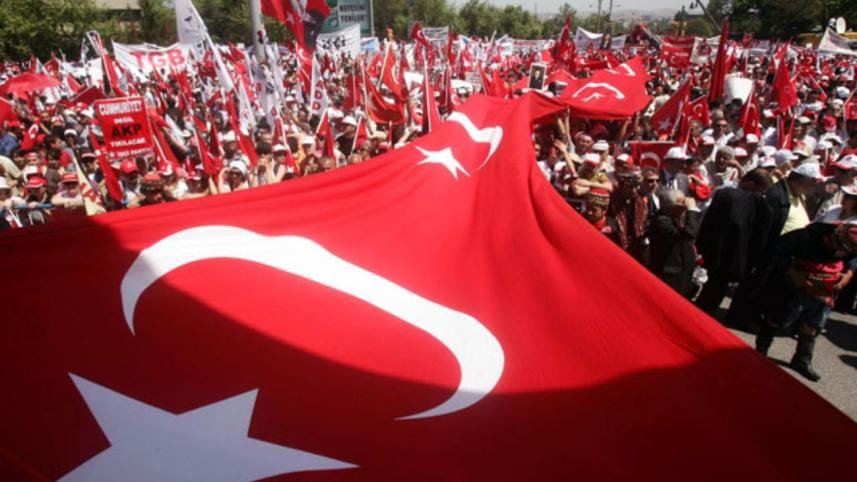Aftershocks of a failed coup

Turkey in the aborted coup scenario looks like it will never be the same again! A crack-down of 'cultural revolution' proportions has got underway. Purges have swept through judiciary, armed forces educational institutions, among others.
As many as 2,700 judges and 100 plus officers of the rank of General or Admiral constituting one-third of the top military hierarchy were eased off to probe their conduct. Fifteen thousand education staff have been suspended for 'siding with the coup'; 1500 university deans ordered to resign; and around ten thousand others were picked up.
Erdogan in no time waged a broadside against Fetullah Gulen,the Pennsylvania-based Islamic cleric accusing him of plotting the coup. Gulen has reacted by saying, "I have stated this 50 times that I am against military coups and interventions. I cannot change course after reaching the age of 77 years". In self-imposed exile in the USA since 1999, he promotes the Hizmet Islam movement that advocates democracy and secular institutions.
In typical opposition parlance, Gulen has attributed the coup to Erdogan implying that he may have courted it so as to embark on a planned crackdown.
The Turkish government has sent a Gulen dossier to the US government asking for his extradition. In case of a negative response from the USA he has threatened reciprocity in regard to US request for extradition.
Turkey, steeped in a history of military interventions suddenly found itself with the military having feet of clay. Citizens threw themselves onto the path of tanks blocking their passage as the personnel on armoured vehicles bowed out. People's will prevailed.
The truth of the matter is that military intervention in politics or attempted usurpation of power is an imposition on the people and is never supported by them.
Turkish army liked to perceive itself in the role of protecting Kemal Ataturk's legacy of modernity and secularism. But after last week's debacle the military is put on notice that it should not even unwittingly try to topple an elected government or be deluded into playing a kingmaker's role.
As a fuller picture unfolds, we are in a position to make a coherent sense of it all. Three big factors combined to save an elected government: Providence saving president Recep Tayyip Erdogan's life; prompt use of social media to galvanize public opinion in his favour and rank follies by the anonymous coup leaders.
Erdogan had left the Marmas resort 20 minutes before the attackers came knocking at his door. The pilot of the jet chasing the aircraft that the president was flying in would be told off by a clever message that it was a Turkish Airliner on his radar.
The coup attempted outside the chain of command stood no chance and the bombing of parliament was considered key to its failure. Moreover, the president's call was complemented by those of the religious affair Diyanet ministry and imams of mosques. Then, opposition leaders and top military officers disavowed the coup,s sealing its fate.
Power equations in the Turkey's well-developed pluralistic political party system make the parties highly competitive and adversarial. In the November,2015 elections, AK Parti, translated into Justice and Develpoment Party, led Erdogan won 49.9 percent of the votes. With a little more than half of the electorate arrayed against him, Erdogan may have felt politically insecure.
CHP, meaning pro-Ataturk Secular Republican People's Party secured 25.4 percent, followed MHP adhering to Turkish nationalism and Euroskepticism bagging 11.9 percent and pro-Kurdish HDP tallying10.7 percent.
Let's not forget, the coup was thwarted at great cost to human lives and limbs, let alone causing people to suffer, families to be divided. It was by no means a bloodless coup. As if that is not enough, witch-hunting and vendetta exactions may be the stuff of which the so-called crackdowns are made.
Turkey's image on human rights and rule of law is likely to face erosion. This is one sign of the country distancing itself from Europe. She may be turning her back to the EU of which she tried to become a member for the last 40 years. This is indicated by the Turkish president's desire to revive the death penalty. He is trying to cash in on the coup attempt. The EU has made it abundantly clear that a country allowing capital punishment is not entitled to its membership.
Turkey may have to rest content with its link to NATO on the eastern flank of the European continent and its 5 billion sterling pounds worth of a deal with the EU to hold back Syrian crisis-induced refugees from migrating to Europe.
The writer is a contributor to The Daily Star. He can be reached at shahhusainimam@gmail.com

 For all latest news, follow The Daily Star's Google News channel.
For all latest news, follow The Daily Star's Google News channel.
Comments